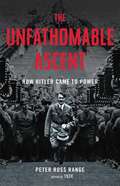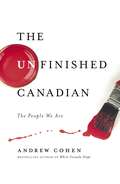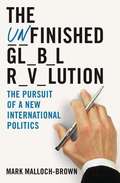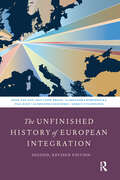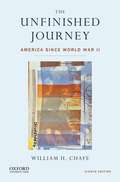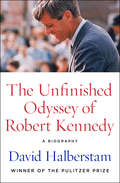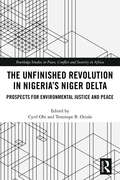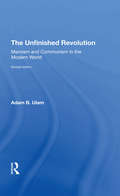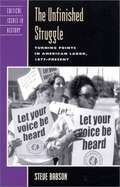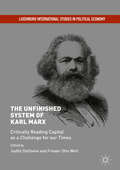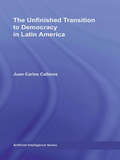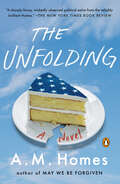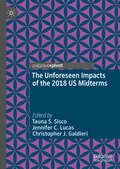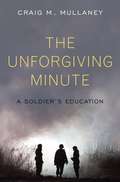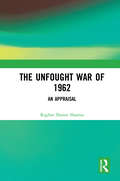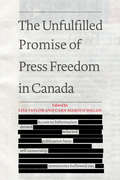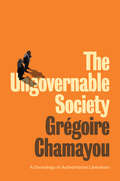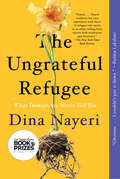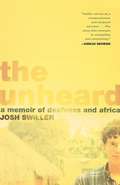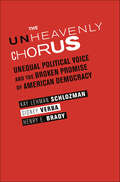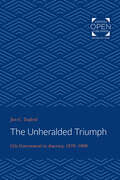- Table View
- List View
The Unfathomable Ascent: How Hitler Came to Power
by Peter Ross RangeThe chilling and little-known story of Adolf Hitler's eight-year march to the pinnacle of German politics.On the night of January 30, 1933, Adolf Hitler leaned out of a spotlit window of the Reich chancellery in Berlin, bursting with joy. The moment seemed unbelievable, even to Hitler. After an improbable political journey that came close to faltering on many occasions, his march to power had finally succeeded.While the path of Hitler's rise has been told in books covering larger portions of his life, no previous work has focused solely on his eight-year climb to rule: 1925-1933. Renowned author Peter Ross Range brings this period back to startling life with a narrative history that describes brushes with power, quests for revenge, nonstop electioneering, American-style campaign tactics, and-for Hitler-moments of gloating triumph followed by abject humiliation.Indeed, this is the tale of a high-school dropout's climb from the infamy of a failed coup to the highest office in Europe's largest country. It is a saga of personal growth and lavish living, a melodrama rife with love affairs and even suicide attempts. But it is also the definitive account of Hitler's unrelenting struggle for control over his raucous movement, as he fought off challenges, built and bullied coalitions, quelled internecine feuds and neutralized his enemies-all culminating in the creation of the Third Reich and the western world's descent into darkness. One of the most dramatic and important stories in world history, Hitler's ascent spans Germany's wobbly recovery from World War I through years of growing prosperity and, finally, into crippling depression.
The Unfinished Canadian: The People We Are
by Andrew CohenThe award-winning, bestselling author of While Canada Slept gives his view of a country wasted on Canadians. What is national character? What makes the Americans, the British, the French, the Russians, and the Chinese who they are? In this homogenized world, where globalization is a byword for a deadening sameness, why do peoples who live in the same region, use the same money, read the same books, and watch the same movies remain different from one another? As much as Canada may be seen as a copy, clone, or colony of America, we are unquestionably distinctive. It is a result of our geography, history, and politics. It comes from our demography and prosperity. Most of all, it comes from our character. In The Unfinished Canadian, Andrew Cohen delves into our past and present in search of our defining national characteristics. He questions hoary shibboleths, soothing mythologies, and old saws with irreverence, humour, and flintiness, unencumbered by our proverbial politeness (itself a great misperception) and our suffocating political correctness. We are so much, in so many shades, and it's time we took an honest look at ourselves. In this provocative, passionate, and elegant book, Cohen argues that our mythology, our jealousy, our complacency, our apathy, our amnesia, and our moderation are all part of the unbearable lightness of being Canadian.From the Hardcover edition.
The Unfinished Global Revolution
by Mark Malloch-BrownAn incomparable public servant and internationalist offers a new vision for international cooperation. In The Unfinished Global Revolution, former United Nations deputy secretary general Mark Malloch- Brown diagnoses the central global predicament of the twenty-first century-as we have become more integrated, we have also become less governed. National governments are no longer equipped to address complex global issues, from climate change to poverty, and international organizations have not yet been empowered to step into the breach. In this book, Malloch- Brown wrenches the discussion away from terrorism, nationalism, and Iraq and calls for a new global politics-a bigger league, with greater opportunity for all. Beneath a spotlight rarely reserved for public servants, Malloch-Brown has been at the center of recent world events: at the World Bank, when it was under siege from activists; and at the UN, where he fought off conservative critics who first attacked its role in development and then turned on Kofi Annan after the Iraq war. In The Unfinished Global Revolution, he draws on his experiences at the front lines of international development over the past several decades-from Cambodia to Darfur, and from Washington to UN headquarters-in order to provide a personal, on-the-ground view of seemingly abstract challenges. The Unfinished Global Revolution chronicles how over the past few decades domestic problems- from unemployment to environmental distress- increasingly have international roots. As national politicians lose control to impersonal global forces, they will be forced to become more effective participants in international mechanisms, such as the United Nations, that may offer the only viable solutions. Increasingly, ad hoc arrangements among NGOs, civil society, and the private sector are filling in the gap created by the failures of individual governments. In the wake of the worldwide economic crisis of 2008, many have been forced to acknowledge that a global economy needs global institutions to govern it. What is true for finance, Malloch- Brown argues, is surely true for public health, poverty, or climate change. In The Unfinished Global Revolution, he calls for us to embrace more powerful international institutions and the values needed to underpin a truly globalist agenda-the rule of law, human rights, and opportunity for all. .
The Unfinished History of European Integration: Second, Revised Edition
by Matthew Broad Aleksandra Komornicka Koen Zon Paul Reef Alessandra SchimmelThe Unfinished History of European Integration is a companion to the history of the European Union. From the aftermath of the First World War to the EU of 27 member states and Russia's invasion of Ukraine, it guides the reader past the main events, crucial sites and key actors that shaped the EU we know today. How did it evolve from a market project to a geopolitical force, what explains the expansion of its membership, institutions, policies and the resistance to this growth, and why does it function as it does? This book provides more than just a chronological account of over seventy years of European integration. It also shows how observers past and present have made sense of the EU. The Unfinished History of European Integration is therefore a unique introduction for readers with different disciplinary backgrounds to understanding the EU. If over seventy years of European integration have taught us anything, it is that fundamental crises as well as moments of rapid institutional change have been constants in its history.
The Unfinished Journey: America Since World War II
by William H. ChafeBrilliantly written by a prize-winning historian, The Unfinished Journey, Eighth Edition, considers both the paradoxes and the possibilities of postwar America. William H. Chafe portrays the significant cultural and political themes that have colored our country's past and present, including issues of race, class, gender, foreign policy, and economic and social reform. He examines such subjects as the Vietnam War, the civil rights movement, the origins and the end of the Cold War, the culture of the 1970s, the rise of the New Right, the events of September 11th and their aftermath, and various presidencies.
The Unfinished Odyssey of Robert Kennedy: A Biography
by David Halberstam&“Far and away the best book written about Senator Kennedy&” from the Pulitzer Prize–winning journalist and bestselling author (The New York Times). Structured around the 1968 Democratic presidential campaign, The Unfinished Odyssey of Robert Kennedy offers an in-depth exploration of Robert Kennedy, both as a man and a politician. Kennedy&’s mass appeal to minority groups, his antiwar stance, and his support from Catholics made him unlike any other politician of his stature in the late 1960s. Acclaimed journalist David Halberstam dives into Kennedy&’s career, covering his work as US attorney general and campaign manager for his brother John, his run for a New York state senate seat, and his candidacy in the 1968 Democratic presidential primary. Through this crucial period, he charts Kennedy&’s evolution as one of the nation&’s most clear-headed progressives, ultimately revealing a man who—even now—personifies the shift toward a more equal America. This ebook features an illustrated biography of David Halberstam including rare images from the author&’s estate.
The Unfinished Odyssey of Robert Kennedy: A Biography
by David Halberstam&“Far and away the best book written about Senator Kennedy&” from the Pulitzer Prize–winning journalist and bestselling author (The New York Times). Structured around the 1968 Democratic presidential campaign, The Unfinished Odyssey of Robert Kennedy offers an in-depth exploration of Robert Kennedy, both as a man and a politician. Kennedy&’s mass appeal to minority groups, his antiwar stance, and his support from Catholics made him unlike any other politician of his stature in the late 1960s. Acclaimed journalist David Halberstam dives into Kennedy&’s career, covering his work as US attorney general and campaign manager for his brother John, his run for a New York state senate seat, and his candidacy in the 1968 Democratic presidential primary. Through this crucial period, he charts Kennedy&’s evolution as one of the nation&’s most clear-headed progressives, ultimately revealing a man who—even now—personifies the shift toward a more equal America. This ebook features an illustrated biography of David Halberstam including rare images from the author&’s estate.
The Unfinished Peace after World War I
by Patrick O. CohrsThis is a highly original and revisionist analysis of British and American efforts to forge a stable Euro-Atlantic peace order between 1919 and the rise of Hitler. Patrick Cohrs argues that this order was not founded at Versailles but rather through the first 'real' peace settlements after World War I - the London reparations settlement of 1924 and the Locarno security pact of 1925. Crucially, both fostered Germany's integration into a fledgling transatlantic peace system, thus laying the only realistic foundations for European stability. What proved decisive was that key decision-makers drew lessons from the 'Great War' and Versailles' shortcomings. Yet Cohrs also re-appraises why they could not sustain the new order, master its gravest crisis - the Great Depression - and prevent Nazism's onslaught. Despite this ultimate failure, he concludes that the 'unfinished peace' of the 1920s prefigured the terms on which a more durable peace could be founded after 1945.
The Unfinished Revolution in Nigeria’s Niger Delta: Prospects for Environmental Justice and Peace (Routledge Studies in Peace, Conflict and Security in Africa)
by Cyril Obi Temitope B. OriolaThe 1990s heralded waves of spectacular forms of local resistance and globalized protest against oil exploitation and environmental pollution in oil-producing regions of the developing world. One of the most spectacular local uprisings against global oil multinationals was led by the Ogoni people who were protesting against the exploitation and marginalization of oil-producing ethnic minority communities in the Niger Delta region of Nigeria. However, the hanging on November 10, 1995 of nine Ogoni ethnic minority and environmental justice activists, including Ken Saro-Wiwa, only served to exacerbate protests in later years. Within a decade, dozens of locally rooted insurgent groups emerged in the Niger Delta and construed themselves as part of the social movement for ethnic minority rights and environmental justice which dates back to colonial times. However, the trajectory of the revolutionary momentum has changed over time, reflecting a mix of progressive, opportunistic and retrogressive trends. This book provides a critical study of the trajectory of struggles in the Niger Delta since 1995, paying attention to continuities and changes, including recent developments linked to the shift from local resistance, to the rupturing of the Presidential Amnesty peace deal (largely to the Movement for the Emancipation of the Niger Delta) and the resurgence low-intensity sporadic armed militancy—led by the Niger Delta Avengers militia among others. The contributors critically interrogate the nature of the region’s political economy, socio-economic trends and trajectories over the past two decades. This collection also accentuates the lessons learnt, prospects for self-determination, socio-economic and environmental justice and peace in the aftermath of the hanging.
The Unfinished Revolution: Marxism And Communism In The Modern World --revised Edition
by Adam B UlamMarxism has been the most pervasive and widespread ideological phenomenon of our times, but seldom, if ever, has it been found in its form. Whenever the Marxist ideology has been historically significant, it has been so as a beneficiary and associate of another set of political beliefs and passions. As a contender for power it seeks to express the dreams and yearnings of societies caught in the painful process of modernization and industrialization. In power it tends to pay lip service to its lofty goals, but associates them with old-fashioned nationalism. Practice does not reflect theory. Ruling elites and parties surpass traditional capitalism in their dedication to political centralization and industrialism at all costs. This revised edition of Adam Ulam's standard work retains the author's summary and critique of Marx's historical, economic, and political arguments. Ulam then examines the relationship of Marxism to other schools of contemporary socialism and to other radical and revolutionary theories. He traces the development of Marxian thought, explains why it has been the potent force in certain societies–while in other societies its influence has been insignificant–and analyzes how Marxism and Leninism have affected the shaping of Russian Communism. Finally Ulam looks at Marxism in the future: the role it will play in the development of the Soviet Union, and how it will affect the contemporary crisis of liberal institutions in the West.
The Unfinished Story of Alger Hiss
by Fred J. CookA very interesting investigation authored by a 1950s-era journalist attempting to demonstrate the innocence of Alger Hiss - a former important US State Department official who was accused of communist subversion and espionage on behalf of the Soviet Union. Author insists that the case against Hiss was never adequately proven and that insufficient documentation and testimony was brought forth during the Hiss hearings. Book raises important questions about the flawed nature and questionable proceedings of American justice.-Print ed.
The Unfinished Struggle: Turning Points in American Labor, 1877-present
by Steve BabsonThe Unfinished Struggle is one of the most concise, comprehensive, and accessible history of the modern American labor movement ever written. Labor scholar and activist Steve Babson's dramatic narrative examines the numerous attempts to organize workers from the Great Uprising of 1877 to the sitdown strikes of the 1930s to the present day. Babson illuminates the tumultuous past, evolving agenda, and continuing conflicts of the labor movement. He carefully identifies the causes of labor's decline in recent decades and explains union leaders' attempts to revive their organizations. Most important, Babson shows readers how the fortunes of organized labor are tied to larger trends in American history.
The Unfinished System of Karl Marx: Critically Reading Capital As A Challenge For Our Times (Luxemburg International Studies In Political Economy Ser.)
by Judith Dellheim Frieder Otto WolfThis book examines what we can gain from a critical reading of Marx's final manuscript and his conclusion of the "systematic presentation" of his critique, which was the basis for Engels's construction of the third volume of his infamous 'Capital'. The text introduces the reader to a key problem´of Marx's largely implicit epistemology, by exploring the systematic character of his exposition and the difference of this kind of 'systematicity' from Hegelian philosophical system construction. The volume contributes to establishing a new understanding of the critique of political economy, as it has been articulated in various debates since the 1960s - especially in France, Germany, and Italy - and as it had already been initiated by Marx and some of his followers, with Rosa Luxemburg in a key role. All the chapters are transdisciplinary in nature, and explore the modern day relevance of Marx's and Luxemburg's theoretical analysis of the dominance of the capitalist mode of production.
The Unfinished Transition to Democracy in Latin America
by Juan Carlos Calleros-AlarcónThis book examines the political evolution of the judiciary – a usually overlooked political actor – and its capacity to contribute to the process of democratic consolidation in Latin America during the 1990s. Calleros analyzes twelve countries in order to assess the independence, impartiality, political strength and efficiency of the judicial branch. The picture that emerges – with the one exception of Costa Rica – is the persistence of weak judicial systems, unable in practice to check other branches of government, including the executive and the military, while not quite effective in fully protecting human rights or in implementing due process of law guarantees. Aggravating issues, such as corruption, heavy case backlogs, overcrowding of prisons, circumvention of laws and personal vulnerability of judges, make the judiciary the least evolved of the three branches of government in the Latin American transitions to democracy.
The Unfolding: A Novel
by A.M. Homes"A dazzling portrait of a family—and a country—in flux…The Unfolding is hilarious and shocking and heartbreaking and just a little bit deranged—in other words, it&’s a book that feels like what it feels like to be alive right now." --Nathan Hill, author of The Nix &“Gripping, sad, funny, by turns aching and antic and, as always, exceedingly well-observed and -written.&”--Michael Chabon, bestselling and Pulitzer Prize-winning author of Moonglow and The Amazing Adventures of Kavalier & Clay In her first novel since the Women&’s Prize award-winning May We Be Forgiven, A.M. Homes delivers us back to ourselves in this stunning alternative history that is both terrifyingly prescient, deeply tender and devastatingly funny.The Big Guy loves his family, money and country. Undone by the results of the 2008 presidential election, he taps a group of like-minded men to reclaim their version of the American Dream. As they build a scheme to disturb and disrupt, the Big Guy also faces turbulence within his family. His wife, Charlotte, grieves a life not lived, while his 18-year-old daughter, Meghan, begins to realize that her favorite subject—history—is not exactly what her father taught her. In a story that is as much about the dynamics within a family as it is about the desire for those in power to remain in power, Homes presciently unpacks a dangerous rift in American identity, prompting a reconsideration of the definition of truth, freedom and democracy—and exploring the explosive consequences of what happens when the same words mean such different things to people living together under one roof.From the writer who is always &“razor sharp and furiously good&” (Zadie Smith), a darkly comic political parable braided with a Bildungsroman that takes us inside the heart of a divided country.
The Unforeseen Impacts of the 2018 US Midterms
by Christopher J. Galdieri Jennifer C. Lucas Tauna S. SiscoThis book explores multiple stories of the 2018 US midterm elections. From retirements and redistricting, to #MeToo and tariffs, it synthesizes the consequences through a thoughtful, empirical analysis. As the final votes are counted, we scholars know that midterm elections matter and have unforeseen consequences for decades to come.
The Unforgiving Minute: A Soldier's Education
by Craig M. MullaneyA West Point grad, Rhodes Scholar, and Army Ranger recounts his unique education and struggles with the hard lessons that only war can teach. One haunting afternoon on Losano Ridge in Afghanistan, U.S. Army Captain Craig Mullaney and his infantry platoon were caught in a deadly firefight with Al Qaeda fighters, when a message came over the radio: one of his soldiers had been killed by the enemy. Mullaney's education, the four years he spent at West Point, and the harrowing test of Ranger School, readied him for a career in the Army. His subsequent experience as a Rhodes Scholar at Oxford couldn't have been further from the Army and his working-class roots, and yet the unorthodox education he received there would be surprisingly relevant as a combat leader. But despite all his preparation, the hardest questions remained. When the call came to lead his platoon into battle and earn his soldiers' salutes, would he be ready? Was his education sufficient for the unforgiving minutes he'd face? Years later, after that excruciating experience in Afghanistan, he would return to the United States to teach history to future Navy and Marine Corps officers at the Naval Academy. He had been in their position once, not long ago. How would he use his own life-changing experience to prepare them? Written with unflinching honesty, The Unforgiving Minute is an unforgettable portrait of a young soldier grappling with the weight of his hard-earned knowledge, while at last coming to terms with what it really means to be a man.
The Unfought War of 1962: An Appraisal
by Raghav Sharan SharmaChina’s territorial disputes with India have been a matter of debate since 1950s. While China has amicably resolved boundary disputes with twelve out of its fourteen neighbouring countries, it is yet to resolve its boundary disputes with India and Bhutan as also its maritime disputes in the South China Sea and East China Sea. This volume looks at the complex dynamics of India–China boundary disputes which remains unresolved. It is still the biggest challenge to the relations between the two countries. From the Indian perspective securing Arunachal and the Indus Watershed is highly important. From the Chinese point of view Karakoram and Xinjiang–Tibet road must be respected. Secondary issues have always occupied a central and pivotal focus in the relations between India and China. This work also shows how British efforts to secure a defined and natural boundary began immediately after the creation of Jammu and Kashmir in 1846 after Amritsar treaty. In the eastern sector such an effort began only in the first decade of twentieth century. Relevant documents have been presented which examines the role of bureaucrats, diplomats, generals and surveyors. It examines the treaties, conventions, correspondence as well as internal debates between changing British officials and their conflicting British policies. Nehru refused Chou En Lai in 1960, which in turn led to the unilateralism in Chinese attitude after 1962. The volume breaks new ground by evaluating the differing policies, and explains how a secured boundary can ultimately be agreed upon. Please note: Taylor & Francis does not sell or distribute the Hardback in India, Pakistan, Nepal, Bhutan, Bangladesh and Sri Lanka
The Unfree Exercise of Religion
by Jonathan FoxReligious discrimination is the norm in many countries around the world, and the rate is rising. Nearly every country which discriminates does so unequally, singling out some religious minorities for more discrimination than others. Religious tradition does not explain this complex issue. For example, Muslim majority states include both the most discriminatory and tolerant states in the world, as is also the case with Christian majority states. Religious ideologies, nationalism, regime, culture, security issues, and political issues are also all part of the answer. In The Unfree Exercise of Religion Jonathan Fox examines how we understand concepts like religious discrimination and religious freedom, and why countries discriminate. He makes a study of religious discrimination against 597 religious minorities in 177 countries between 1990 and 2008. While 29 types of discrimination are discussed in this book, the most common include restrictions in places of worship, proselytizing, and religious education.
The Unfulfilled Promise of Press Freedom in Canada
by Lisa Taylor Cara-Marie O'HaganCanadian news reports are riddled with accounts of Access to Information requests denied and government reports released with large swaths of content redacted. The Unfulfilled Promise of Press Freedom in Canada offers a vast array of viewpoints that critically analyze the application and interpretation of press freedom under the Charter of Rights. This collection, assiduously put together by editors Lisa Taylor and Cara-Marie O’Hagan, showcases the insights of leading authorities in law, journalism, and academia as well as broadcasters and public servants. The contributors explore the ways in which press freedom has been constrained by outside forces, like governmental interference, threats of libel suits, and financial constraints. These intersectional and multifaceted lines of inquiry provide the reader with a 360-degree assessment of press freedom in Canada while discouraging complacency among Canadian citizens. After all, an informed citizenry is a free citizenry.
The Ungovernable Society: A Genealogy of Authoritarian Liberalism
by Grégoire ChamayouRebellion was in the air. Workers were on strike, students were demonstrating on campuses, discipline was breaking down. No relation of domination was left untouched – the relation between the sexes, the racial order, the hierarchies of class, relationships in families, workplaces and colleges. The upheavals of the late 1960s and early 1970s quickly spread through all sectors of social and economic life, threatening to make society ungovernable. This crisis was also the birthplace of the authoritarian liberalism which continues to cast its shadow across the world in which we now live. To ward off the threat, new arts of government were devised by elites in business-related circles, which included a war against the trade unions, the primacy of shareholder value and a dethroning of politics. The neoliberalism that thus began its triumphal march was not, however, determined by a simple ‘state phobia’ and a desire to free up the economy from government interference. On the contrary, the strategy for overcoming the crisis of governability consisted in an authoritarian liberalism in which the liberalization of society went hand-in-hand with new forms of power imposed from above: a ‘strong state’ for a ‘free economy’ became the new magic formula of our capitalist societies. The new arts of government devised by ruling elites are still with us today and we can understand their nature and lasting influence only by re-examining the history of the conflicts that brought them into being.
The Ungrateful Refugee: What Immigrants Never Tell You
by Dina NayeriA Finalist for the 2019 Kirkus Prize in Nonfiction"Nayeri combines her own experience with those of refugees she meets as an adult, telling their stories with tenderness and reverence.” —The New York Times Book Review"Nayeri weaves her empowering personal story with those of the ‘feared swarms’ . . . Her family’s escape from Isfahan to Oklahoma, which involved waiting in Dubai and Italy, is wildly fascinating . . . Using energetic prose, Nayeri is an excellent conduit for these heart–rending stories, eschewing judgment and employing care in threading the stories in with her own . . . This is a memoir laced with stimulus and plenty of heart at a time when the latter has grown elusive.” —Star–Tribune (Minneapolis)Aged eight, Dina Nayeri fled Iran along with her mother and brother and lived in the crumbling shell of an Italian hotel–turned–refugee camp. Eventually she was granted asylum in America. She settled in Oklahoma, then made her way to Princeton University. In this book, Nayeri weaves together her own vivid story with the stories of other refugees and asylum seekers in recent years, bringing us inside their daily lives and taking us through the different stages of their journeys, from escape to asylum to resettlement. In these pages, a couple fall in love over the phone, and women gather to prepare the noodles that remind them of home. A closeted queer man tries to make his case truthfully as he seeks asylum, and a translator attempts to help new arrivals present their stories to officials.Nayeri confronts notions like “the swarm,” and, on the other hand, “good” immigrants. She calls attention to the harmful way in which Western governments privilege certain dangers over others. With surprising and provocative questions, The Ungrateful Refugee challenges us to rethink how we talk about the refugee crisis.“A writer who confronts issues that are key to the refugee experience.” —Viet Thanh Nguyen, Pulitzer Prize–winning author of The Sympathizer and The Refugees
The Unheard: A Memoir of Deafness and Africa
by Josh SwillerSwiller spent his early years in frustrated limbo on the sidelines of the hearing world. So he decided to abandon the well-trodden path after college, setting out to find a place so far removed that his deafness would become irrelevant.
The Unheavenly Chorus: Unequal Political Voice and the Broken Promise of American Democracy
by Sidney Verba Henry E. Brady Kay Lehman SchlozmanWhy American democracy favors the affluent and educatedPolitically active individuals and organizations make huge investments of time, energy, and money to influence everything from election outcomes to congressional subcommittee hearings to local school politics, while other groups and individual citizens seem woefully underrepresented in our political system. The Unheavenly Chorus is the most comprehensive and systematic examination of political voice in America ever undertaken—and its findings are sobering.The Unheavenly Chorus is the first book to look at the political participation of individual citizens alongside the political advocacy of thousands of organized interests—membership associations such as unions, professional associations, trade associations, and citizens groups, as well as organizations like corporations, hospitals, and universities. Drawing on numerous in-depth surveys of members of the public as well as the largest database of interest organizations ever created—representing more than thirty-five thousand organizations over a twenty-five-year period—this book conclusively demonstrates that American democracy is marred by deeply ingrained and persistent class-based political inequality. The well educated and affluent are active in many ways to make their voices heard, while the less advantaged are not. This book reveals how the political voices of organized interests are even less representative than those of individuals, how political advantage is handed down across generations, how recruitment to political activity perpetuates and exaggerates existing biases, how political voice on the Internet replicates these inequalities—and more.In a true democracy, the preferences and needs of all citizens deserve equal consideration. Yet equal consideration is only possible with equal citizen voice. The Unheavenly Chorus reveals how far we really are from the democratic ideal and how hard it would be to attain it.
The Unheralded Triumph: City Government in America, 1870-1900 (The Johns Hopkins University Studies in Historical and Political Science #102)
by Jon C. TeafordOriginally published in 1984. In 1888 the British observer James Bryce declared "the government of cities" to be "the one conspicuous failure of the United States." During the following two decades, urban reformers would repeat Bryce's words with ritualistic regularity; nearly a century later, his comment continues to set the tone for most assessments of nineteenth-century city government. Yet by the end of the century, as Jon Teaford argues in this important reappraisal, American cities boasted the most abundant water supplies, brightest street lights, grandest parks, largest public libraries, and most efficient systems of transportation in the world. Far from being a "conspicuous failure," municipal governments of the late nineteenth century had successfully met challenges of an unprecedented magnitude and complexity. The Unheralded Triumph draws together the histories of the most important cities of the Gilded Age—especially New York, Chicago, Boston, Philadelphia, St. Louis, and Baltimore—to chart the expansion of services and the improvement of urban environments between 1870 and 1900. It examines the ways in which cities were transformed, in a period of rapid population growth and increased social unrest, into places suitable for living. Teaford demonstrates how, during the last decades of the nineteenth century, municipal governments adapted to societal change with the aid of generally compliant state legislatures. These were the years that saw the professionalization of city government and the political accommodation of the diverse ethnic, economic, and social elements that compose America's heterogeneous urban society. Teaford acknowledges that the expansion of urban services dangerously strained city budgets and that graft, embezzlement, overcharging, and payroll-padding presented serious problems throughout the period. The dissatisfaction with city governments arose, however, not so much from any failure to achieve concrete results as from the conflicts between those hostile groups accommodated within the newly created system: "For persons of principle and gentlemen who prized honor, it seemed a failure yet American municipal government left as a legacy such achievements as Central Park, the new Croton Aqueduct, and the Brooklyn Bridge, monuments of public enterprise that offered new pleasures and conveniences for millions of urban citizens."
